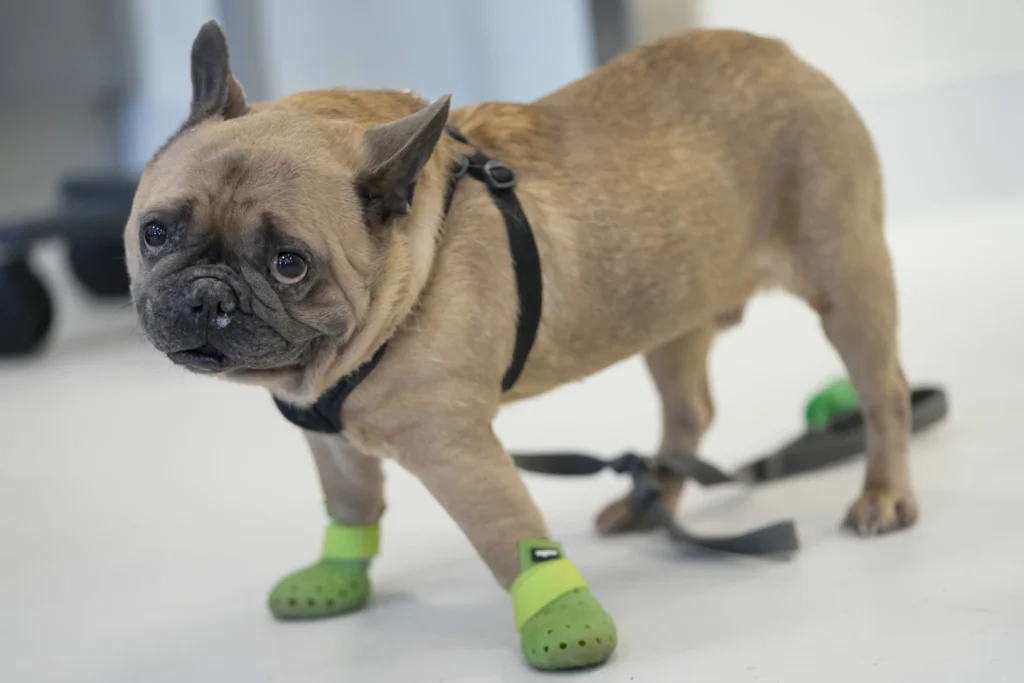The Schwarzman Animal Medical Center in New York City stands as a beacon of excellence in veterinary care, providing a haven for beloved pets like Harrison, the lime-green-bootie-wearing French bulldog, and Lynx, the short-haired cat from Brooklyn with a persistent groin wound.
Under the expert guidance of Dr. Daniel Spector and a dedicated team of over 130 veterinarians, this renowned facility has become a cornerstone of advanced medical treatment for animals in need.
Harrison, a prime example of the challenges faced by popular breeds like French bulldogs, receives comprehensive care at the AMC, where specialists from various disciplines collaborate to ensure his well-being.
The seamless coordination between teams, coupled with state-of-the-art facilities such as a blood bank and a top-tier surgical suite, enables the center to handle complex cases that other clinics may find daunting.
Beyond its technical prowess, the Schwarzman Animal Medical Center also exemplifies compassion and generosity.
Through initiatives like the Kiki White Umbrella Cockatoo Avian Fund and the Buddy Fund, the hospital extends support to families facing financial constraints in caring for their avian companions and pets battling cancer, respectively.
The commitment to charity care, especially for rescue animals like Lynx, underscores the center’s dedication to providing exceptional treatment regardless of financial circumstances.
The narrative of Lynx’s journey to recovery paints a poignant picture of the hospital’s commitment to every patient that walks through its doors.

From the delicate handling of the injured cat to the meticulous planning of her treatment, every step reflects a blend of expertise and empathy that defines the AMC’s approach to veterinary medicine.
As the cost of veterinary services continues to rise due to inflation and advancements in care, the Schwarzman Animal Medical Center remains unwavering in its mission to deliver top-notch treatment while also fostering the next generation of veterinary professionals.
The hospital’s status as a training ground for specialized care underscores its commitment to excellence and innovation in the field of animal medicine.
In conclusion, the Schwarzman Animal Medical Center stands as a shining example of compassionate, cutting-edge veterinary care.
From its world-class facilities to its unwavering dedication to charity work, this institution embodies the highest standards of excellence in the treatment of our cherished animal companions.
As Harrison and Lynx can attest, the Schwarzman Animal Medical Center is not just a hospital—it is a sanctuary where pets and their owners find hope, healing, and a true sense of community.
The story of the expansion and renovation of the Animal Medical Center (AMC) without the need for a mortgage, as highlighted by Helen Irving, the president and CEO of AMC, showcases a commendable feat in financial management for a nonprofit organization.
The ability to reinvest all operational earnings directly back into caring for the animals is a testament to the dedication and resourcefulness of the team behind AMC.
The generous contributions from donors like Elaine and Kenneth Langone, notable for their philanthropic endeavors and love for animals, have played a significant role in supporting AMC’s mission.

Elaine Langone’s touching account of their dog in cancer care exemplifies the profound impact that such donations can have on the lives of these animals in need.
The rising costs of veterinary care, as emphasized by Dr. Emily McCobb, present a significant challenge for pet owners, with many unable to afford even essential treatments.
This financial barrier underscores the importance of initiatives like AMC’s charity programs and the need for increased access to affordable veterinary services.
Dr. Kelly Hall’s emphasis on the invaluable human-animal bond further underscores the significance of quality veterinary care in preserving these relationships.
The stories of animals saving lives serve as a poignant reminder of the immeasurable value that pets bring to their owners’ lives.
AMC’s commitment to providing charity programs and promoting responsible pet ownership, as advocated by Irving, reflects a holistic approach to addressing the challenges in the veterinary care landscape.
The successful clearance of Harrison for his necessary dental operation, made possible through AMC’s efforts and Kim’s pet insurance, exemplifies the positive outcomes that collaboration and support can achieve in ensuring the well-being of animals.

In conclusion, the narrative surrounding AMC’s expansion, the generosity of donors like the Langones, and the challenges in veterinary care underscore the intricate interplay between financial sustainability, philanthropy, and the human-animal bond.
As we navigate the complexities of providing quality care for our animal companions, it is imperative that we continue to support initiatives that prioritize their welfare and strengthen the bonds that enrich our lives.
